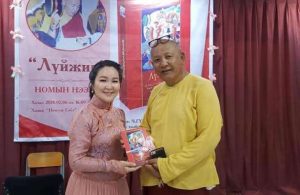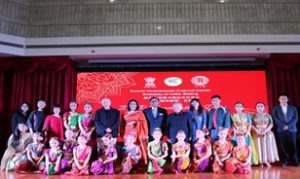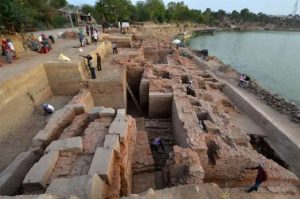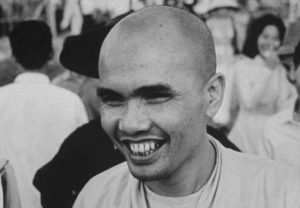
84000: Translating the Words of the Buddha, a global nonprofit initiative founded by the renowned Bhutanese lama, author, and filmmaker Dzongsar Jamyang Khyentse Rinpoche, has announced that it will host a live-streamed teaching by Rinpoche for the Tibetan month of Saga Dawa. Rinpoche will offer a teaching on the Gold Sutra in an in-person and online event at the Deer Park Institute in Bir, India, on 22 May, the day before Saga Dawa Duchen,
Saga Dawa (Skt: Vaishakha), the fourth month in the Tibetan lunar calendar, is the most important Buddhist religious and cultural event of the year. The name is derived from the clan name of Shakyamuni Buddha. The occasion is also known in Tibetan as Bumgyur Dawa, “the 100,000-multiplying month,” as karma from all skillful and unskillful actions is believed to be multiplied 100,000 times. This year, Saga Dawa runs from 12 May–10 June, with Saga Dawa Duchen, the single most important day of the year for Tibetan Buddhists, commemorating the birth, enlightenment, and final passing into parinirvana of Shakyamuni Buddha, falling on 26 May, the full moon day. The occasion is also known around the world as Buddha Purnima and Vesak in other Buddhist traditions and following different calendars.
“On 22 May, the day before Saga Dawa Düchen, we are honored to host a teaching on the Gold Sutra by Dzongsar Khyentse Rinpoche at Deer Park Institute . . . in Bir, India,” 84000 said in an announcement shared with BDG. “During this in-person and live-streamed event, Rinpoche will offer words of wisdom related to the Gold Sutra, as well as lead a worldwide resounding on the sutra.”
As the Saga Dawa month approaches, prepare for a series of exciting online and offline activities we’ve specially curated for this auspicious time. More details coming soon!”
84000: Translating the Words of the Buddha is a long-term undertaking to translate and publish all surviving canonical texts preserved in the Classical Tibetan language—70,000 pages of the Kangyur (the translated words of the Buddha) in 25 years and 161,800 pages of the Tengyur (the translated commentaries on the Buddha’s teachings by the great Indian Buddhist masters and scholars) in 100 years. According to 84000, less than 5 per cent of the canon had hitherto been translated into a modern language, and due to a rapid decline in the knowledge of Classical Tibetan and in the number of qualified scholars, the world is in danger of losing an irreplaceable cultural and spiritual wisdom legacy.

“The Gold Sutra presents a very brief but meaningful teaching on the mind of awakening, the aspiration to attain the unsurpassed and perfect awakening of a buddha for the benefit of all beings,” 84000 explained. “It consists of the Buddha’s answer to a single question posed by Venerable Ananda about how the mind of awakening should be viewed. The Buddha declares that the mind of awakening is like gold because it is pure, and he gives the analogy that just as a smith may shape gold into various forms, yet the nature of the gold itself does not change, so too the mind of awakening appears with various unique attributes, yet the nature of the mind of awakening itself does not change. The Buddha then proclaims a single four-line verse that succinctly articulates the nature of the mind of awakening and the way to practice it.” (84000: Translating the Words of the Buddha)
The Deer Park Institute, where this special event will be held, was established in 2006 in Bir, in the northern Indian state of Himachal Pradesh, as a registered educational society by Rinpoche. The institute was founded with a vision of preserving and propagating the profound classical wisdom traditions of India in the non-sectarian spirit of the university of Nalanda. The name is intended to evoke Shakyamuni Buddha’s first teachings at the historic Deer Park in Sarnath, where the he first shared the spirit of bias-free enquiry into the nature of mind, existence, and suffering. The Deer Park Institute’s programs encompass the disciplines of listening, contemplating, and meditating, leading to genuine understanding and realization.
Born in Bhutan in 1961, Dzongsar Khyentse Rinpoche is the son of Thinley Norbu Rinpoche and was a close student of the Nyingma master Dilgo Khyentse Rinpoche (1910–91). He is recognized as the third incarnation of the 19th century Tibetan terton Jamyang Khyentse Wangpo (1820–1892), founder of the Khyentse lineage, and the immediate incarnation of Jamyang Khyentse Chökyi Lodrö (1893–1959).
In addition to Siddhartha’s Intent, Rinpoche’s projects include: Khyentse Foundation, established in 2001 to promote the Buddha’s teaching and support all traditions of Buddhist study and practice; 84000, a non-profit global initiative to translate the words of the Buddha and make them available to all; Lotus Outreach, which directs a range of projects to ensure the education, health, and safety of vulnerable women and children in the developing world; and Lhomon Society, which promotes sustainable development in Bhutan through education.
Rinpoche is the author of several books, including: What Makes You Not a Buddhist (2006), Not For Happiness (2012), The Guru Drinks Bourbon? (2016), and Poison is Medicine: Clarifying the Vajrayana (2021), and has garnered renown inside and outside of the global Buddhist community for the feature-length films he has written and directed: The Cup (1999), Travellers and Magicians (2004), Vara: A Blessing (2012), Hema Hema: Sing Me a Song While I Wait (2016), Looking For A Lady with Fangs and a Moustache (2019), and Pig at the Crossing (2024).
See more
The Gold Sūtra (84000: Translating the Words of the Buddha)
84000: Translating the Words of the Buddha
Deer Park Institute
Related news reports from BDG
Khyentse Norbu’s Pig at the Crossing Set for virtual premiere on 11 May
Online Dharma: Khyentse Foundation Announces the Launch of its Revamped Website
Less Meat More Love! Khyentse Foundation Announces New Book for Children
Trent Walker Wins Khyentse Foundation’s 2024 Award for Outstanding Translation
Online Dharma: Dzongsar Khyentse Rinpoche to Give Public Teaching in Hong Kong













